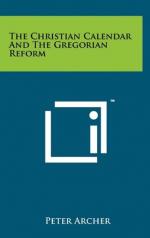|
This section contains 1,662 words (approx. 6 pages at 300 words per page) |

|
Overview
Few of us have cause to question whether or not calendars are correct. We hang them on the wall to remind us of what day and month it is, or when holidays fall. In the Middle Ages, one of the most important functions of the calendar was to set the dates for important religious festivals, such as Easter. By the thirteenth century, astronomers began to notice that the calendar currently in use did not correspond to observations; most significantly, the equinoxes did not fall on the days on which they were supposed to fall. In 1582, after centuries of calls for calendar reform, the Gregorian reform was finally established.
Background
Calendars are human constructs that allow us to track the passing of time. Certain aspects of the calendar have an astronomical basis. A day is the time it...
|
This section contains 1,662 words (approx. 6 pages at 300 words per page) |

|


